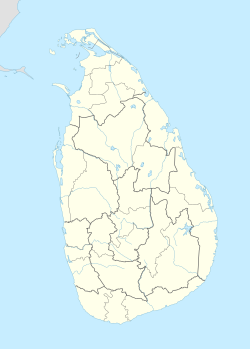Holy Emmanuel Church (Sinhala: හඟුරන්කෙත ශුද්ධ එමානුවෙල් දේවස්ථානය) is an Anglican stone church, located in Hanguranketha.[1] The church was constructed in 1886 by Charles Henry de Soysa and is one of the oldest churches in the district.[2][3] It is located approximately 4 km (2.5 mi) south of the town centre, adjoining Hanguranketha C. C. Vidyalaya.
| Holy Emmanuel Church, Hanguranketha | |
|---|---|
| 7°10′20″N 80°46′44″E / 7.1722655°N 80.77878°E | |
| Location | Haragama Road, Hanguranketha, Sri Lanka |
| Denomination | Anglican |
| Website | Holy Emmanuel Church, Hanguranketha |
| History | |
| Consecrated | 1886 |
| Architecture | |
| Functional status | Active |
| Architectural type | Church |
| Style | Victorian Gothic |
| Specifications | |
| Number of towers | one |
| Administration | |
| Metropolis | Archbishop of Canterbury |
| Diocese | Diocese of Kurunegala |
In 1834 the Church Mission Society established a Christian missionary school in Hanguranketha, the school is now known as Hanguranketha C. C. Vidyalaya (Sinhala: හගුරන්කෙත සීසී විද්යාලය). In 1855, Reverend E. T. Higgins, a missionary and representative of the Diocese of Colombo, came to Haguranketha and proposed that a church be built near the school site. The land adjacent to the school was donated by the landowners, Mr. Gammuladani and Mr. Wijeratne.[4][5] On 4 August 1880, Mudaliyar Susew de Soysa, the brother of Gate Mudaliyar Jeronis de Soysa, built a semi-permanent building, which was used for worshipping by the locals.[4][6] Following his death in 1881, his nephew, Charles Henry de Soysa, donated sufficient funds to complete the construction of a permanent church building,[7] which was furbished with an altar and wooden pews.[5] Following de Soysa's death in 1890, his wife, Catherine, donated the funds to build and furnish a rectory, to house the church priest.[4][5] The de Soysa family, whilst Buddhist, were well known for their philanthropic works in the district, financially supporting and establishing hospitals, schools, roads and churches. In 1826 Jeronis de Soysa, purchased his first estate, 195 ha (482 acres), in Hanguranketha, the first Ceylonese to establish a coffee plantation in the district.
In 1938 a new bell tower was built, by Father Don Lewis Welikala, who became the church's first Sinhalese priest.[4][5] In 1944 C. S. Koraya started a weaving centre near the church.
On 6 July 2007 the church building was formally recognised by the Government as an Archaeological Protected Monument.[8]
See also
editReferences
edit- ^ "Churches - Diocese of Kurunagala". Diocese of Kurunegala. Retrieved 21 November 2023.
- ^ Abeyawardana, H. A. P. (2004). Heritage of Kandurata: Major natural, cultural and historic sites. Colombo: The Central Bank of Sri lanka. p. 253.
- ^ Wijesinghe, T. K. (2015). Pauranika Sthana Saha Smaraka: Nuwara Eliya Distrikkaya (in Sinhala). Department of Archaeology (Sri Lanka). p. 23-25. ISBN 9559159364.
- ^ a b c d Gunaratne, Raja (31 March 2017). "At the foot of the moonlit altar". Dinamina (in Sinhala). Retrieved 21 November 2023.
- ^ a b c d Wijayaratne, Dinusha (29 July 2023). "The only church in Sri Lanka with a moonlit church is the Holy Emmanuel Church in Hamguranketa" (in Sinhala). Ceylon Newspapers. Retrieved 21 November 2023.
- ^ Medis, Frederick Medis, ed. (1995). The Church of Ceylon: A History, 1945-1995. Diocese of Colombo. p. 343. ISBN 9789559411000.
- ^ Fernando, N. T. B. (26 February 2017). "Charles Henry de Soysa: Sri Lanka's greatest philanthropist". Sunday Observer. Retrieved 21 November 2023.
- ^ "PART I : Section (I) — General Government Notifications" (PDF). The Gazette of the Democratic Socialist Republic of Sri Lanka. 1505: 548. 6 July 2007.
